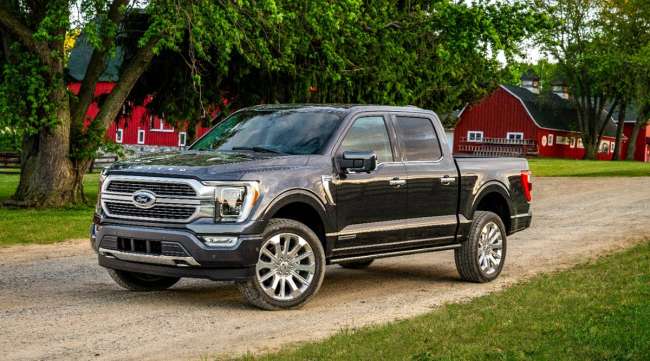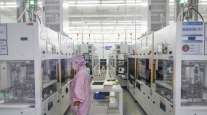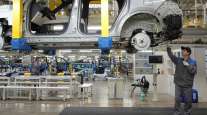Bloomberg News
EV-Battery Rivals Prod Biden With Rare Trade Veto in Balance

[Stay on top of transportation news: Get TTNews in your inbox.]
Two of the world’s largest electric-vehicle battery-makers have hired top Washington insiders to hold near-daily meetings with the Biden administration in a battle that could affect the electrification plans of Ford Motor Co. and Volkswagen AG.
SK Innovation Co., Ford’s battery supplier for its upcoming electric F-150 pickup truck, faces a 10-year U.S. import ban on its Korean-made batteries and components after April 11. SK Innovation has engaged such well-connected advocates as former EPA chief Carol Browner and one-time Acting Attorney General Sally Yates to convince the administration to intervene.
LG Energy Solution Co., which won the order against its rival from the U.S. International Trade Commission for what the agency said was an “extraordinary” effort to destroy evidence in a trade secrets battle, has also brought in hired guns to influence the Biden team. Ernest Moniz, an Obama energy secretary, is advising Seoul-based LG Energy on its strategic plans, while other insiders are lobbying the administration.
“The development of the battery supply chain is going to depend on what happens with this case,” Moniz said in an interview.
Meetings are being held with at least a dozen agencies, including officials at Labor, Transportation and Energy. Talks, conducted over the internet because of the COVID-19 pandemic, have focused on “climate change, electrification of vehicles, the Ford F-150 and jobs,” said Browner, Bill Clinton’s Environmental Protection Agency chief who also served as a White House climate adviser when Biden was vice president.
Biden has until April 11 to intervene. Presidential vetoes, known formally as “disapprovals,” of ITC import bans are rare. The last one was in 2013, when the Obama administration overturned a U.S. import ban on some older models of Apple Inc.’s iPhones and iPads in a blow to Samsung Electronics Co.
The issue is a complicated one for Biden. The president has made the promotion of EVs a cornerstone of his $2.25 trillion infrastructure plan to bolster the economy and combat climate change. Both South Korean battery-makers are building plants in the U.S. that would employ thousands of American workers. At the same time, Biden can’t be seen as wavering on intellectual property protection considering the long-standing U.S. dispute with China over the issue.
While every ITC import ban undergoes a presidential review, “it’s not often that there’s a meaningfully contested one,” said LG Energy’s lawyer, David Callahan of Latham & Watkins in Chicago, who’s been coordinating meetings between agency officials and LG Energy’s senior executives.
LG Energy filed its claim against SK Innovation in April 2019 for allegedly stealing trade secrets by poaching scores of highly knowledgeable employees. Since then, both companies have spared no expense to employ the services of Washington influencers. In 2020, SK Innovation spent $650,000 on its lobbying efforts and LG spent $531,666, according to data collected by the Center for Responsive Politics.
Lobbyists for LG Energy, SK Innovation, Ford and Volkswagen have been meeting with more than a dozen agencies including the Commerce, Justice and Defense departments; the EPA; the National Economic Council, and the National Security Council. U.S. Trade Representative Katherine Tai, who’s designated to make the decision, has the task of assessing the information and deciding which arguments hold clout.
Under the ITC order, SK Innovation will be able to import components for four years beginning now for U.S. battery production for Ford’s EV F-150 launching next year, and for Volkswagen’s American MEB line for two years, to give the automakers time to transition to new domestic suppliers.
Only 14.3% of the truck driver population is made up of African Americans, followed by 13% Hispanic, and 7% Asian. In this episode, host Michael Freeze wonders what industry leaders are doing to increase those percentages. We talk to two trucking industry experts who have implemented their own practices that are contributing to a more diverse work community. Hear a snippet, above, and get the full program by going to RoadSigns.TTNews.com.
Ford declined to comment for this article. But company officials have said the four-year reprieve isn’t long enough. The EV F-150 is “a critical project for us,” Jonathan Jennings, the company’s global commodity pricing vice president, told the Senate Finance Committee on March 16. He said that if the dispute isn’t resolved, Ford would have to look to import EV batteries from foreign suppliers for its pickups, instead of having SK Innovation manufacture them at two U.S.-based plants being constructed in Commerce, Ga.
Scott Keogh, CEO of Volkswagen Group of America, said in a LinkedIn post April 7 that past presidents have overturned the commission and “President Biden could do so in this case.”
The decision “could accelerate the future of zero-emission vehicles and green jobs, or threaten to reduce U.S. battery capacity and delay the transition to electric vehicles,” Keogh wrote. “There are other mechanisms in place in the legal system to further ensure the protection of IP rights without the devastating impact to unintended victims not party to the case.”
The case also has drawn in state lawmakers because of the number of American jobs at stake. SK Innovation’s Georgia plants — the first of which is due to start commercial production in early 2022 — are expected to create 2,600 jobs, according to Bloomberg New Energy Finance. LG Energy already has a battery plant in Michigan and one planned for Ohio.
SK Innovation has warned it may pull out of the U.S. if the government doesn’t veto the import ban. The company already has plants in Hungary and Poland, and expects to build more as demand for electric-vehicles increases.
LG Energy, in a March 10 letter to Sen. Raphael Warnock, a Democrat from Georgia, said SK Innovation’s threats lack credibility because the company’s unlikely to spend billions of dollars to build factories and then walk away.
If Biden doesn’t act and the import ban takes effect, SK Innovation’s next step is the courts. It’s already asked the ITC to delay implementation of the ban until it can appeal the underlying decision. Those requests are rarely granted, but are required before SK can turn to the U.S. Court of Appeals for the Federal Circuit, which has issued stays to maintain the status quo while it considers the case.
— With assistance from Kyunghee Park, Keith Laing and Gabrielle Coppola.
Want more news? Listen to today's daily briefing below or go here for more info:





